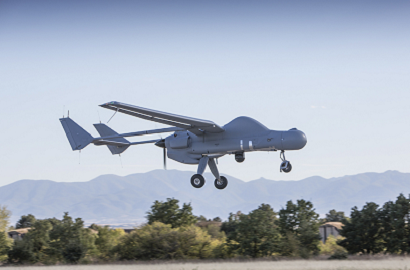Telespazio and Leonardo l drive forward drone development to fight fires in Canaries

The two companies are teaming up to use the innovative Falco EVO, a remotely-piloted aerial vehicle.
Telespazio Ibérica, which specialises in geoinformation, and the industrial group Leonardo, whose activity focuses on the aerospace, defence and security (AD&S) industries, have signed an agreement to use the Falco EVO, a remotely-piloted aerial vehicle, as a tool to fight sixth-generation forest fires and contribute to protecting biodiversity in the Canary Islands.
This contract is one of the initiatives promoted by Telespazio Ibérica and Pegasus Aero Group through the temporary joint venture (TJV) with which they became strategic partners with the Canary Islands government in March 2024. Drone-monitored controlled burning began to be piloted at the end of last year.
Extreme conditions
Telespazio Ibérica is the Spanish subsidiary of Telespazio, a joint venture between Italy's Leonardo and France's Thales. Specialising in geoinformation and satellite navigation, its alliance with Leonardo, one of its parent company's partners, will enable the Falco EVO to be used in fire-fighting. Capable of flying for up to 20 hours at an altitude of 6,400 metres, the aircraft can carry over 100 kilos and has a wingspan of 12.5 metres, being 6.2 metres long and 2.5 metres high.
The first unit will arrive in the Canary Islands to coincide with the start of the fire season. The agreement includes 700 operational flight hours, and will be available for use all year round, although a higher impact is expected in the summer season. Thanks to its camera, maps and automatic flight mode, it can operate day and night in rain, wind and extreme temperatures, from -40ºC to 50ºC.
Real-time data
The aircraft will deliver the captured data in real time to the Geoinformation Centre (GIC), where the data, ranging from electro-optical to infrared and radar images, will be processed in an automated way by trained and validated artificial intelligence algorithms. This will facilitate decision-making by emergency services in the event of a disaster.
The use of new innovative technological solutions, such as remotely-piloted aircraft, responds to new needs arising from climate change. This facilitates flame monitoring, detection of new outbreaks and coordination with firefighting teams, especially in the case of sixth-generation fires, which are becoming more frequent, more intense, faster and more unpredictable.
AI-based algorithms
Telespazio Ibérica CEO Carlos Fernández de la Peña explains that this aircraft “will provide thermal and visible information in image and video format, which will allow us to deal with the different phases of the fire: prevention, early detection, monitoring and post-fire stages. The prevention phase is crucial, as the data used, together with AI-based algorithms, will be utilised to detect suspicious activity, as well as for 3D mapping and fire risk mapping.”
Leonardo Aircraft Division's Senior Vice President of Sales, Alberto Pietro Berruti, is pleased to contribute “to this programme for protecting environmental heritage and preventing and fighting against some of the most serious phenomena that can threaten it. The Falco family of remotely-piloted systems is strongly representative of our advanced integrated capabilities (platform, sensors and interoperability) in the industry, and use of these technologies is consistent with our industrial plan's commitment to sustainability.”
Photo: Telespazio




